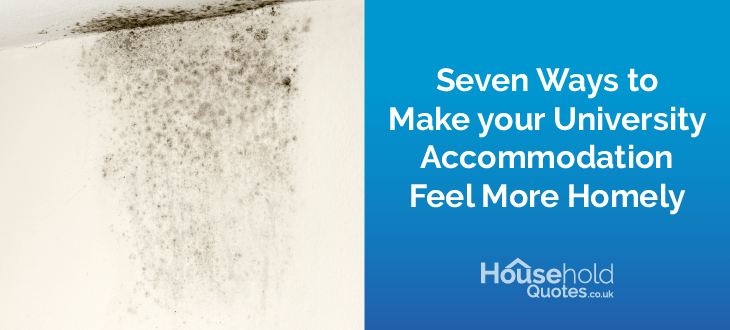- Householdquotes.co.uk
- Blog
- Seven tips to avoid dampness and mould in your home
Seven tips to avoid dampness and mould in your home


Mould and dampness are huge problems for households across the UK, it occurs when moist air comes into contact with cold surfaces. This is why mould and dampness are so common on the walls and ceilings of a property.
They can cause serious health problems, as after the mould and dampness spread, household members will breathe in the nasty particles. Young children are particularly affected as their respiratory systems aren’t fully developed. Those with breathing conditions such as asthma are also at serious risk as the mould could trigger an attack.
Fortunately, there are ways to avoid the build-up of dampness and mould in your home, so our Property Expert at Household Quotes has revealed seven tips.
1. Open your windows
Opening your windows allows lingering moist air to escape, and new fresh air to enter your home. It will keep your property smelling fresh and help prevent moisture from coming in contact with cold surfaces. Keep your windows open for at least a couple of hours each day (weather dependent), but be careful not to leave a window open whilst you’re out of the home, as this may attract burglars.
2. Keep your home warm
For mould and dampness to build the moist air requires a cold surface to come into contact with. Keeping your home warm will also keep your walls, ceiling and furniture warm. Heating can be expensive, so my suggestion is to open your windows earlier in the day. Then when you’re ready to turn the heating on, put it on low with the windows shut for a couple of hours. After that turn the heating off and your home should hopefully retain the heat for the rest of the day.
3. Turn on your bathroom fan
Showers can cause a real mould and dampness problem, you might’ve noticed the large amount of condensation after you’ve washed. This stays in the air and sits on the walls and mirrors of your bathroom. So before you have a shower, turn on the bathroom fan and keep it on for at least half an hour after. Bathroom fans work by removing moisture and humidity from the air and then releasing it outside of your home.
4. Put lids on pots
Boiling food in water causes condensation, so start putting lids on top of the pot. This will not only allow the food to cook quicker due to the retention of heat but will also help prevent the build-up of dampness and mould. Your kitchen might also have a hood fan, make sure that it’s switched on if you’re using the hobs. If you’re boiling water then put it onto its highest setting to ensure as much moisture is removed as possible.
5. Use a dehumidifier
To ensure moisture is not in the air of your home, you could invest in a dehumidifier. This is a machine that lowers humidity levels in a room by drawing in moist air, filtering it and removing the water before releasing it. It’s very efficient at its job and is a good gadget to use if you have a room with poor ventilation. Dehumidifiers can be picked up for around £100 brand new, however second-hand ones will be cheaper.
6. Don't dry clothes indoor
Many people get out their drying rack to use inside their homes. This is a big mistake, as the moisture from the clothes has to go somewhere, and that will be on your walls, ceiling and furniture. After a while, mould and dampness will start to build if you are not careful. So prioritise drying your clothes outside on a washing line, or if this is not possible then you could use a well-ventilated room.
7. Open internal doors
Opening your internal doors is a great way to keep your home smelling fresh. It means any time you open a window or external door, your whole property will feel the benefit. This is particularly important if you unknowingly have moisture lingering, open doors will allow air to flow around your home until it escapes. Doing this also stops build-up on the doors themselves.
Joshua Houston, Property Expert at Household Quotes:
‘’Keeping your home properly ventilated is crucial for preventing the build-up of dampness and mould. Following my tips will save you a lot of time and money, and the majority does not cost you a penny to incorporate into your home.
Ensure your family members safety, as the most important thing about where you live is that it doesn’t have a negative impact on health.’’

Josh Houston is a writer at Household Quotes whose passionate about the world of renewable energy, energy saving solutions and home improvements. He specialises in providing useful tips that our readers can adopt for their own needs. His skills involve translating complex topics to something more understandable.
